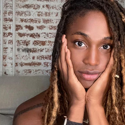
Mental health continues to dominate the headlines, especially for the LGBTQ community, where rates of depression often exceed the national average, a problem compounded by the isolation of the Covid pandemic.
In July, BIPOC Mental Health Month promotes another layer of awareness to acknowledge the complexities that individuals with intersectional identities face. Campaigns such as Depression Looks Like Me offer a platform for a diverse range of voices to be seen, heard, and empowered.
Queerty spoke to the multi-talented artist, director, author and campaign partner, Chella Man, about his personal experience with depression. As a Deaf, trans, Jewish, and Chinese-American public figure, Chella shared why he chose to join Depression Looks Like Me to tell his own story and how he hopes his transparency can help others.
Hi Chella! You’re always involved in such cool projects. We heard you just curated an art exhibit — can you tell us more about it?
How about we take this to the next level?
Our newsletter is like a refreshing cocktail (or mocktail) of LGBTQ+ entertainment and pop culture, served up with a side of eye-candy.
Sure! The art exhibit is called “Pure Joy,” and it runs June 30 – August 15 at the 1969 Gallery in New York City. It’s all disabled artists and many different mediums and ages involved. It’s been one of my most passionate projects recently because there’s so much struggle and trauma highlighted right now in the news with disabled individuals but also just queer individuals. So to be focusing on art and the joy of creating art and just connecting more with my disabled community, it’s been absolutely incredible.

What were you looking for when curating the exhibit?
I was just looking for diversity. Essentially, I wanted people who were well-established in their careers as disabled artists but also people who are just starting out, which has led to a wide age range. In addition, I wanted people to translate the title in their own way, to show that definitions are so subjective. It’s been incredible to include works that go directly with the literary tone of the word joy — it highlights euphoria or bliss. But then other individuals focused directly on the pain and the suffering, but the joy is within the process of creation.
It’s beautiful to see how people interpret things differently because it’s just perspective, you know. There’s not a right or wrong. I’ve moved throughout my life just discarding binaries in general, but it’s been beautiful to see the range not only within disability but when the way that disabled individuals think and interpret things.
It’s been a tumultuous couple of years. Do you turn to books, music, TV, or film, or are there other more tactile, environmental things that you use to center and ground yourself?
That’s a fantastic question. I honestly have so much inspiration in my life through my daily experiences and the relationships I prioritize and foster. Sometimes consuming other forms of art such as TV, or going to see shows is almost too overwhelming because I feel like there’s so much to do, so much to say, and so much to create that adding more on top of it is almost like an overload. But at times, I love to do it because I’m so curious about perspective. In terms of inspiration, I find it everywhere. And that’s a blessing and a curse because there’s a lot to see and do.

You mentioned people close in your life that give you some of that. Is there any moment or incident lately that comes to mind, or a relationship as of late that’s bringing you joy, happiness, or contentment?
There are so many. I recently moved in with my best friend, Vinnie, who I met when I was in eighth grade. They’re probably the oldest friend I have, and to come full circle, and just operating as a family as we truly are — we formed such a deep connection, and they became part of my chosen family very quickly. They were the first person outside of my biological family to start learning sign language for me and has been just an incredible rock.
You’re such a role model in the queer community, and beyond that, to talk about your experience with depression. Can you share more about that and why you’ve chosen to be public about that part of your life?
I’ve always been open about depression — I can’t imagine not speaking about it. It wasn’t even something I hesitated about. As soon as I figured out that I had depression, I was very open about talking about my experiences with it. Because it’s important to share that life is just a mixture of emotions. We can’t have joy without the pain. And it’s important to highlight both because if you hide one facet, the narrative becomes that it is wrong or bad when it’s just a part of life. And to hide a part of life makes other people feel as if it’s wrong to feel just pieces of being alive.
It’s important to share and be transparent about all the things that you’re feeling, even if it’s not a preferable emotion, like depression. Helping to normalize the conversation around depression and contributing to a sense of community for others is one of the main reasons I was drawn to Depression Looks Like Me — highlighting these topics that are often deemed taboo connects people on a deeper level because you realize how human it is to experience these things. And it only brings everyone closer and allows people to feel more comfortable being human.

Was there a particular time that you spoke to your parents or Vinnie, who you said you’ve known for a long time, that you felt like, ‘Oh, I’m feeling this on the inside and it needs to be expressed outside’?
In eighth grade, I felt like I needed help. And luckily, this is a huge privilege, but my mom is a pediatrician. One moment I distinctly remember we were driving back home to central Pennsylvania from Baltimore. I had to make that trip every week because I had just had my cochlear implant surgeries. So instead of being able to hang out with my friends on my free days, I would have to commute to Baltimore and take auditory training to re-learn how to process sound and hear now that I had my cochlear implants.
I’m sure that was a facet. I mean, there were so many facets I was going through that I couldn’t explain: not being able to articulate the fact that I was trans, not being able to understand my genderqueer identity, trying to navigate disability through an ableist framework rather than disability justice, not having representation in many different ways, you know, being a queer, disabled BIPOC person growing up. I didn’t have mentors, so all of this was just weighing on me. And by the time I was in eighth grade, I felt so disconnected. And, of course, I had no idea why because I just had no guidance that way. And I remember telling my mom but couldn’t articulate why. But in that car ride home from Baltimore, I was like, “I need help. I am struggling.” I wasn’t finding joy essentially, which is why curating “Pure Joy,” which is about including so many disabled BIPOC queer people, is just the best thing.
It sounds like it came full circle.
It was a circle I never knew I’d complete. So back then, in eighth grade, I did tell my mom, but I couldn’t even say I was depressed because I wasn’t sure what that was exactly. But because she’s a medical practitioner, she was like, “Okay, this is what you’re dealing with. You’re dealing with depression. Don’t worry, there are ways that you can cope with it.”
There are so many different avenues of help. In addition, I wish I was just taught more about myself. I wish I was shown disabled history, queer history, BIPOC history — representation and access to tailored resources are crucial as you learn about the different facets of depression – so that you know you are not alone.
As you got older, what were some ways you navigated some of those challenges— of seeing yourself in the solution?
Education is life-changing. And access to education. It’s not easy; unfortunately, there are so many barriers with disability, but also the amount of information we have out there, being able to find that information and understand the terminology.

How did you start to piece all these ideas together?
I believe that I started educating myself similar to what we all do as human beings from the second I was born — just trusting myself and noticing my likes and dislikes, my desires and dreams. And I began to question why they were there. Ironically, I feel like I’m trying to question less at this age and just accept more as long as I’m leading with love and compassion as my center value.
“Our worth isn’t a fight; our worth is in our ability to breathe. Our worth is inside of us as soon as we’re born. It’s not anything that we ever have to prove. We are inherently worthy just by being.” — Chella Man
What skills have you cultivated over the years to take care of your mental health?
I meditate twice a day — 20 minutes in the morning and 20 minutes at night. That always grounds me and I have no expectations for the meditation. I don’t go into it being like, “Oh, after these 20 minutes, I’m gonna feel better!” It’s just allowing yourself time to feel and process. Because there’s a lot that goes into life. Being really gentle with yourself and having compassion for yourself are so key. Sometimes after the meditation, I’ll call upon an affirmation or a phrase that I want to lead my day with. People call this setting an intention sometimes or leading with an affirmation.
I’m just in a phase where I remember that I have to prioritize joy. And not only joy but play. We work so hard, and we fight so much as marginalized people, especially intersectionally marginalized individuals. We begin to learn that our worth isn’t a fight; our worth is in our ability to breathe. Our worth is inside of us as soon as we’re born. It’s not anything that we ever have to prove. We are inherently worthy just by being.
What would you say to someone experiencing depression?
First and foremost, please be gentle with yourself, and remember that you are worthy and deserving of love. Externally, of course, but also in how you treat yourself. Watch how you speak to yourself, if you would talk to your best friend or the person you love most in the world the way that you are talking to yourself.
You are deserving of the energy to ask for help. I guarantee you there are so many people out there, whether they are in your life right now or not, who want to help you and who are equipped to help you.
There are many different avenues to find help.

















